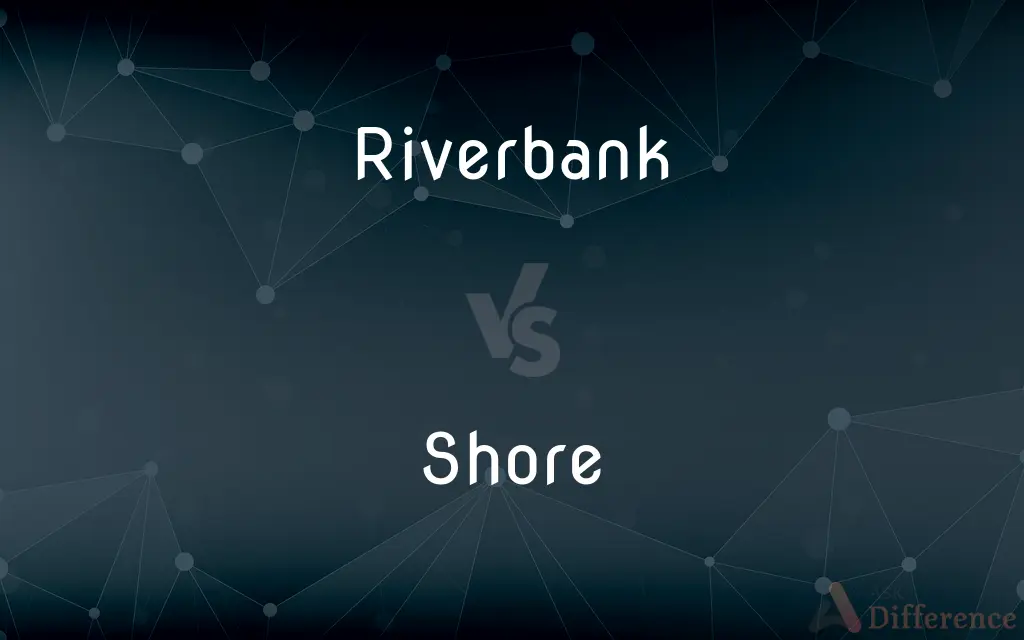Riverbank vs. Shore — What's the Difference?
By Fiza Rafique & Urooj Arif — Updated on April 3, 2024
A riverbank is the land along the sides of a river, often supporting vegetation, while a shore is the land edge of any water body, including seas, lakes, and rivers.

Difference Between Riverbank and Shore
Table of Contents
ADVERTISEMENT
Key Differences
A riverbank specifically refers to the sides of a river. It's characterized by its proximity to the flowing water of a river and is often covered with specific vegetation adapted to moist conditions. On the other hand, a shore encompasses the broader edge of any water body, including oceans, lakes, and rivers. It represents the transition zone between aquatic and terrestrial ecosystems.
Riverbanks are integral to river ecosystems, providing habitat for various species and contributing to the river's health and stability. Whereas shores serve a similar ecological role but on a potentially larger scale, affecting larger bodies of water such as seas and lakes, and are influenced by a wider range of environmental factors.
The term "riverbank" implies a narrower scope, focusing on rivers alone. This specificity means that discussions about riverbanks often delve into freshwater ecology, sedimentation, and riverine processes. Conversely, the term "shore" suggests a more diverse set of conditions and environments, from sandy beaches to rocky coastlines, influenced by both freshwater and saltwater bodies.
Erosion and deposition processes are significant at riverbanks, shaped by the river's flow, volume, and sediment load. In contrast, shores are shaped by a combination of factors including wave action, tidal movements, and sometimes the flow of rivers into larger bodies of water, leading to diverse geological features.
Human interactions with riverbanks and shores differ due to their locations and uses. Riverbanks are often sites for activities like fishing, canoeing, and riverside walks, reflecting the human connection to rivers. Shores, especially those by seas and lakes, can be major tourist destinations, recreational spaces, and areas of significant economic activity through ports and coastal industries.
ADVERTISEMENT
Comparison Chart
Definition
The land along the sides of a river.
The land edge of any body of water.
Water Body
Exclusively rivers.
Oceans, lakes, rivers, and seas.
Ecological Role
Supports riverine ecosystems and vegetation.
Transitional zone for various aquatic and terrestrial ecosystems.
Erosion Factors
Influenced primarily by the river’s flow.
Shaped by wave action, tides, and sometimes river flow.
Human Interaction
Sites for fishing, canoeing, and riverside walks.
Tourist destinations, recreational spaces, ports, and coastal industries.
Compare with Definitions
Riverbank
The land immediately adjacent to a river.
The willows on the riverbank swayed in the gentle breeze.
Shore
The edge of a body of water.
Waves lapped gently at the shore.
Riverbank
A natural habitat for riparian vegetation.
Beavers are commonly found along the riverbank.
Shore
Popular for beach activities and tourism.
The shore was crowded with tourists enjoying the sunny day.
Riverbank
Subject to flooding and deposition.
The floodwaters receded, leaving a layer of silt on the riverbank.
Shore
A diverse ecosystem for plants and animals.
The shore is home to numerous species of birds and marine life.
Riverbank
A location for recreational activities.
We set up our picnic on the riverbank under the shade of tall trees.
Shore
Can be sandy, rocky, or pebbly.
The shore was rocky, making it difficult to walk barefoot.
Riverbank
Affected by the river’s flow and sediment.
The riverbank eroded significantly after the heavy rains.
Shore
Subject to tides and waves.
The high tide brought seaweed onto the shore.
Riverbank
The bank of a river.
Shore
A shore or a shoreline is the fringe of land at the edge of a large body of water, such as an ocean, sea, or lake. In physical oceanography, a shore is the wider fringe that is geologically modified by the action of the body of water past and present, while the beach is at the edge of the shore, representing the intertidal zone where there is one.
Riverbank
A sloped side of a river acting as a barrier between the water and level ground to either side.
Shore
The land along the edge of an ocean, sea, lake, or river; a coast.
Riverbank
The bank of a river
Shore
Often shores Land; country
Far from our native shores.
Shore
Land as opposed to water
A sailor with an assignment on shore.
Shore
A beam or timber propped against a structure to provide support.
Shore
To support by or as if by a prop
Shored up the sagging floors.
Shored up the peace initiative.
Shore
A past tense of shear.
Shore
Land adjoining a non-flowing body of water, such as an ocean, lake or pond.
Shore
(from the perspective of one on a body of water) Land, usually near a port.
The seamen were serving on shore instead of in ships.
The passengers signed up for shore tours.
Shore
A prop or strut supporting some structure or weight above it.
The shores stayed upright during the earthquake.
Shore
(obsolete) To set on shore.
Shore
Not followed by up: to provide (something) with support.
Shore
Usually followed by up: to reinforce (something at risk of failure).
My family shored me up after I failed the GED.
The workers were shoring up the dock after part of it fell into the water.
Shore
To threaten or warn (someone).
Shore
To offer (someone).
Shore
A sewer.
Shore
A prop, as a timber, placed as a brace or support against the side of a building or other structure; a prop placed beneath anything, as a beam, to prevent it from sinking or sagging.
Shore
The coast or land adjacent to a large body of water, as an ocean, lake, or large river.
Michael Cassio,Lieutenant to the warlike Moor Othello,Is come shore.
The fruitful shore of muddy Nile.
Shore
To support by a shore or shores; to prop; - usually with up; as, to shore up a building.
Shore
To set on shore.
Shore
The land along the edge of a body of water
Shore
A beam or timber that is propped against a structure to provide support
Shore
Serve as a shore to;
The river was shored by trees
Shore
Arrive on shore;
The ship landed in Pearl Harbor
Shore
Support by placing against something solid or rigid;
Shore and buttress an old building
Common Curiosities
What defines a shore?
A shore is the edge of any body of water, including seas, lakes, and rivers, and can vary in composition from sandy beaches to rocky coastlines.
What is a riverbank?
A riverbank is the land immediately adjacent to the sides of a river, often hosting specific vegetation and wildlife adapted to its conditions.
How do riverbanks and shores differ ecologically?
Riverbanks are critical to river ecosystems, supporting freshwater habitats, while shores interact with a broader range of aquatic and terrestrial ecosystems.
What factors influence the formation of shores?
Shores are shaped by wave action, tidal movements, and in some cases, river flows, leading to diverse physical features.
Can both riverbanks and shores be recreational areas?
Yes, riverbanks often attract activities like fishing and canoeing, while shores are popular for beach activities and tourism.
How do human activities impact riverbanks and shores?
Human activities, including development, pollution, and recreational use, can significantly impact both riverbanks and shores, affecting their ecological health and physical structure.
Why are shores important to ecosystems?
Shores are vital transition zones that support diverse habitats and species, contributing to ecological balance and biodiversity.
Are riverbanks affected by erosion?
Yes, riverbanks are significantly affected by erosion, primarily due to the river's flow and sediment transport.
What is the significance of erosion and deposition along riverbanks?
Erosion and deposition processes shape riverbanks, affecting their stability, vegetation, and habitat suitability for various species.
Can riverbanks serve as natural flood barriers?
Yes, riverbanks can act as natural flood barriers, although their effectiveness depends on their height, vegetation, and soil composition.
What role do humans play in preserving riverbanks and shores?
Humans play a crucial role in preserving riverbanks and shores through conservation efforts, pollution control, and sustainable development practices.
Is there vegetation specific to riverbanks?
Yes, riverbanks host riparian vegetation adapted to moist, often fluctuating conditions.
How do the characteristics of riverbanks and shores differ in urban vs. rural areas?
In urban areas, riverbanks and shores may be more developed and altered by human activities, while in rural areas, they tend to be more natural and less disturbed.
Do shores vary depending on the body of water?
Yes, shores can vary dramatically, from sandy beaches of seas and oceans to the rocky or vegetated edges of lakes and rivers.
How does the width of a river affect its riverbank?
The width of a river can influence the extent of the riverbank, its vegetation cover, and its susceptibility to erosion and flooding.
Share Your Discovery

Previous Comparison
Win vs. Earn
Next Comparison
Fiction vs. FakeAuthor Spotlight
Written by
Fiza RafiqueFiza Rafique is a skilled content writer at AskDifference.com, where she meticulously refines and enhances written pieces. Drawing from her vast editorial expertise, Fiza ensures clarity, accuracy, and precision in every article. Passionate about language, she continually seeks to elevate the quality of content for readers worldwide.
Co-written by
Urooj ArifUrooj is a skilled content writer at Ask Difference, known for her exceptional ability to simplify complex topics into engaging and informative content. With a passion for research and a flair for clear, concise writing, she consistently delivers articles that resonate with our diverse audience.
















































